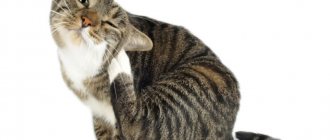Concern for the well-being of a small pet makes people wonder why the kitten constantly sleeps. Having a poor understanding of the characteristics of the animal’s body, it is worth understanding the question of what to do if the kitten is constantly sleeping, and how you can help in this incomprehensible situation.
Features of long sleep in kittens
Many pet owners know that cats are real sleepyheads and spend most of their time sleeping in a secluded place. This is a characteristic habit of animals accustomed to hunting at night. Domesticated cats do not require the constant vigilance of their wild relatives, so they can spend up to 18 hours sleeping every day. This behavior allows them to fully digest the protein food they eat, and also maintains health and saves energy for the active period of wakefulness.
If a small kitten sleeps constantly, the reasons may be different. It is normal for healthy newborn kittens and cubs under two months of age to sleep almost constantly. In the earliest stages of growing up, during sleep, accelerated growth of the animal’s body and strengthening of the nervous and immune systems are observed.
Already at four months of age, some kittens reach the size of adult animals. Such intensive development requires a lot of strength and energy, so the kitten may constantly feel drowsy and must be at rest. Under no circumstances should a small pet be prevented from getting enough sleep, or should be woken up or disturbed, as this can cause illness and even the death of the baby.
If the animal does not show any signs of illness, there is no need to interfere with the natural development process. Within a few weeks, the kitten will feel stronger and more confident for more active pastime.
Normal sleep duration for an animal
Like human offspring, kittens sleep almost all the time, interrupting only to feed. This is completely normal, because their body is still very weak. In their sleep they grow and become stronger. A slightly older cub sleeps less, but still at least half a day.
An adult cat sleeps about the same amount or a little less/more. It is impossible to give an exact figure, because all animals have a pronounced individuality. Much depends on the character. Some cats are energetic, active, they play a lot and have fun. Others are inert, lethargic, prone to weight gain and much less active than their vigorous counterparts. Most of the time they just sleep.
There is a popular expression: “sleeps like a cat with half an eye.” This is a very apt remark. Unlike humans, who must sleep at least 7-8 hours in a row to restore energy, cats sleep in “short intervals.” On average, they simply doze for most of the time without losing their alertness. As soon as the slightest rustle is heard, the cats immediately wake up.
All sleep in cats is divided into two phases:
- Nap, superficial “slow” sleep – 20-30 minutes.
- Deep, “fast” sleep – 5-7 minutes. At this time, animals, like people, dream. Cat owners are well aware of this, since a sleeping pet can twitch its paws in its sleep, “run” and even meow. All this clearly indicates the presence of dreams.
The duration of sleep can be influenced by various external factors, for example, extreme fatigue, stress, changes in temperature. Physiology also influences the duration of rest. Pregnant cats sleep much more - this is a need for the body experiencing increased stress.
Causes of drowsiness in kittens
Other factors, in addition to the natural cycles of the body, are often external causes that affect both small kittens and adult animals:
1) weather conditions;
2) level of calm in the environment;
3) absence of irritants and dangers.
Sleepiness in kittens is influenced by feelings of satiety and fatigue from intense activity. In addition, in the summer heat or before rain, if the kitten is constantly sleeping, the cause may be low atmospheric pressure. Hormonal levels also affect drowsiness, because, as a rule, males are more active than females, so prolonged sleep in female kittens is by no means uncommon.
Cats fall asleep gradually, and dozing is replaced by deep sleep. According to scientists, cats can dream, and they often make meowing sounds, squeaks, and move their paws, which is a feature of their expression of emotions and should not be a cause for concern.
These reasons should not cause panic among animal owners, since they are due to the natural features of the life of their pets.
How long should a kitten sleep?
In the first month of life, small, still blind kittens sleep about 23 hours a day. In the second month, the waking time increases to 6 hours, and by six months the animals adapt to the adult regime, and they spend about 16 hours sleeping. They sleep mainly during the day, because cats prefer to play at night. This is the norm for healthy cats in good health.
At 3 months, the normal amount of sleep for a kitten is 18 hours.
Possible diseases with symptoms of drowsiness
Only an examination by a qualified veterinarian can reveal the true cause of persistent drowsiness in kittens. However, there are a number of diseases for which prolonged sleep, apathy, and lethargy are considered characteristic signs:
1) the presence of parasites – fleas, ticks, helmites;
2) food poisoning;
3) intestinal obstruction;
4) bruises and dislocations;
5) urolithiasis.
These are the most common diseases that affect young kittens. These are quite painful ailments that cause weakness, loss of strength and, as a result, drowsiness. But despite the difficulties of treatment, it is possible to cope with these ailments, which will allow your little pet to return to vigor and health.
More dangerous diseases for an animal, due to which it has to constantly sleep, may be the following ailments:
1) anemia;
2) gastritis;
3) leukemia;
4) kidney inflammation;
5) retroviruses.
Confirming the presence of diseases and prescribing the correct treatment can only be done with the help of a veterinarian, who will indicate the necessary list of medications and procedures for treating the kitten.
Causes of lethargy
When an animal is sick, it becomes drowsy, aggressive, and lethargic. This condition is immediately noticeable in children, because when nothing bothers them, they love to jump and play.
There are several explanations why a kitten is lethargic.:
Any medication, injections and operations can have side effects on the animal’s condition. Often the kitten is lethargic after deworming, which indicates an incorrect dosage or an advanced disease. If your cat feels unwell for more than two days, contact your veterinarian. Gastric lavage may be required.
© shutterstock
In addition to the diseases listed, a kitten may be lethargic due to anemia, obesity, poisoning, metabolic disorders, or urolithiasis. A prolonged decrease in the cat's activity, loss of appetite, and avoidance of communication should alert you. You should not give your pet injections or pills yourself, as this may worsen his condition.
What to do about sleepiness in kittens
In order for a small kitten to fully develop and get sound, healthy sleep, you should carefully take care of your pet’s health. What to do if the kitten sleeps constantly? First of all, you need to make sure that he receives suitable nutrition, which does not contain prohibited foods that can cause allergies and stomach problems. The kitten should be protected from external noise, ensure peace in the house and a comfortable place where it can sleep. Over time, the kitten will be able to regain strength for more energetic activities.
If drowsiness becomes unhealthy, then you should not postpone a visit to a specialist. Timely observation and intervention can save a pet's life, allowing it to live many more joyful years with its owner.
Useful links:
Norm or pathology
Prolonged napping in kittens is normal in most cases, but in some cases it indicates illness. If during the waking period the kitten frolics, runs, eats well and shows interest in the world around it, then prolonged sleep is considered the norm, as it is necessary to restore strength.
After sterilization
It should be noted that after sterilization surgery, the cat does not eat and sleeps all the time; this is a normal state after anesthesia. If this period lasts for 24 hours, then there is nothing to worry about. If a day has passed and the condition does not change, you need to urgently see a veterinarian.
During the first 24 hours, you don’t need to force the cat to get up or wake him up if she doesn’t want to. Just like insisting on food and drink. Give her a little rest, recover, and she will again delight you with her cheerful appearance.
If the anesthesia has not worn off and the cat is not sleeping, gets up and tries to move around the apartment, do not let it out of sight so that it does not accidentally get injured. It’s better to take her in your arms, calm her down, and maybe she’ll fall asleep. Sleep is the best medicine here.
Alarming symptoms
An apathetic drowsy state is one of the signs of a developing pathological process, but it is always accompanied by additional signs:
- Due to partial or complete lack of appetite, the pet refuses even its favorite dishes and treats.
- The surface of the nose becomes dry and hot, and mucous may be discharged.
- Apathetic state - the cat does not respond to light, sounds, or touches.
- Refusal of water or excessive thirst.
- An increase in body temperature above 40 degrees, which can be seen by the hot tips of the ears.
- Diarrhea or vomiting.
- Pallor of the mucous membranes, deterioration of the coat.
If it is noticed that the kitten is not only constantly sleeping, but is also suffering from one or more alarming symptoms, then it should be immediately shown to a veterinarian. A full professional examination, as well as tests, will help to quickly determine the cause of the atypical behavior and cure the cat.
Sleep phases
The sleep of mustachioed pets consists of two constantly alternating phases: slow and fast. During the first phase, the animal dozes. Despite the slowdown in heart rate, breathing and metabolic processes, his muscles remain tense and his brain remains active. This maintains the sensitive response to external stimuli necessary for survival.
A curled up cat quickly and easily wakes up if disturbed by its owner or a loud sound. The slow phase lasts no more than 30 minutes.
In the absence of stimuli, the first phase flows into the second. At this stage, the body is completely relaxed, so you can see twitching of the paws, eyelids and whiskers. The duration of the fast phase is no more than 7 minutes.
For homeless animals it is shorter, since it is very difficult to wake up at this time. Losing control over what is happening can result in death. Pets do not have this problem - the safer he feels, the longer his fast phase.
Changes in sleep depending on age
Experienced felinologists know that the duration of a cat's sleep varies depending on the age of the individual. The approximate duration of rest is as follows:
- Kittens up to three weeks sleep 22-23 hours, and wake up only to eat.
- Month-old babies have been resting for 20-21 hours, and spend the rest of the time exploring the world and playing their first games.
- Kittens from two months sleep for 18-20 hours.
- Adults are in the arms of Morpheus for 14 to 16 hours, which is considered the norm.
- Old animals sleep on average 22 hours, and wake up only to eat, go to the toilet and take a short walk or be close to the owner.
Sleep is an important component of a cat’s life, without which it will not be able to please its owners, frolic, run and hunt. A full, long rest, not accompanied by a lack of appetite and lethargy, is the key to health and longevity.
Differences between a tired cat and a lethargic cat
It can be difficult to determine whether a cat is truly lethargic and sick or is simply tired and needs extra sleep.
- Behavior of a tired cat
A tired cat will sleep longer, but when awakened, will play, run, explore, and behave normally while continuing to eat and drink. Tired cats are only tired for a short time. Once they've had a good night's sleep after an exciting day, they're ready to return to their normal day as a curious, active cat.
- Lethargic cat behavior
A lethargic cat will have a long period of weakness, depression, or lack of energy. Even after a nice long nap or relaxing sunbathing, these cats will remain tired and not as active as usual. Cats with lethargy are sick, and there are usually other signs that something is wrong.
Many lethargic cats hide in a quiet, dark place, such as under a bed or in a closet. They tend to prefer areas away from people and other pets.
The cat is lethargic and sleeps all the time: what is the reason?
Among the pathological causes of lethargy are the following:
- poisoning,
- hormonal disorders after childbirth or as a result of using contraceptives,
- side effects of corticosteroid anti-inflammatory drugs,
- musculoskeletal pathologies,
- infectious diseases,
- worms;
- anemia;
- hypovitaminosis;
- tumors;
- chronic diseases.
Stress causes ambivalence in cats. The pet may become sleepy or, conversely, show aggression.
What not to do when your kitten won't sleep at night
Sometimes owners driven to despair resort to not entirely humane methods in order to get at least a little peace:
- When a pet does not allow you to sleep at night, it happens that the owner, trying to calm the animal, locks it either in the bathroom or in another room. In this way, it will not be possible to accustom a cat to rest at night, because it will begin to run around and scream even more, not understanding why it was treated so unfairly.
- When the owner, dreaming of a night's sleep, sprays the pet with water, he, of course, gets the long-awaited rest, but not for long until he licks himself. He won’t do this for a long time, then the noise will start again. The cat does not feel guilty; such methods seem offensive to him.
- Sometimes the owner follows the cat’s lead and begins to play with it, caress it, and feed it. In no case should you act this way; she will get used to it, and then life will become even more fun.
You can try covering the windows in the house with heavy curtains at night, this way the morning will take longer for the cat, and the owner will have a little extra time to soak in bed.
When a healthy cat does not allow its owner to rest peacefully at night, this means that it cannot adapt to the human regime in any way, but lives under the influence of natural instincts. If the pet is not sleeping, then the owner must behave calmly and competently.
When a person behaves aggressively towards an animal, it will be even worse, firstly, the cat will be offended by such behavior and will become even more indignant about this. Secondly, everything that happens will only amuse him, because he has achieved what he wanted: the owner’s attention. Over time, cats will calm down and become less playful; you need to endure a little and retrain your pet to your rhythm of life.











